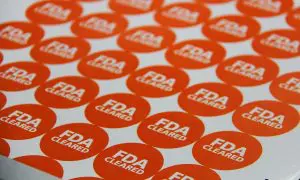 The US vapour industry has welcomed last week’s unexpected announcement by the Food and Drug Administration (FDA) that it would extend some compliance deadlines by nearly four years.
The US vapour industry has welcomed last week’s unexpected announcement by the Food and Drug Administration (FDA) that it would extend some compliance deadlines by nearly four years.
Indeed, many in the industry had worked toward a similar outcome – a long period of freedom before premarket tobacco product applications (PMTAs) must be submitted – and are eager to receive credit for influencing the FDA’s decision.
The decision is widely seen as an acceptance of the “continuum of risk” concept, clarifying previous indications of FDA commissioner Scott Gottlieb’s support; earlier, the extent to which that support would translate into action was initially murky.
The Smoke-Free Alternatives Trade Association (SFATA) said it “applauded” the announcement.
“Commissioner Gottlieb has established a new, evidence-based framework for evaluating new products such as vapor products, which recognizes the public health benefits that can be achieved by helping people switch to low-risk forms of nicotine delivery,” SFATA said.
“Now our small business retailers and manufacturers can focus on continuing to help people switch to safe alternatives, and our government can use this opportunity to gather more science and move to a rational, transparent process for product regulation,” said SFATA executive director Pamela Gorman.
At the Vapor Technology Association (VTA), executive director Tony Abboud called the decision a “victory” for science-based regulation and public health.
“By delaying the deadline for compliance for Electronic Nicotine Delivery Systems, FDA has also recognized that the current regulations have halted the kind of technological innovation that is key to ending this country’s reliance on combustible cigarettes, and that we need to implement clear and meaningful regulations that strike the right balance between consumer protection and fostering innovation,” Abboud said.
Spotting the difference
Agreed VapAria president William Bartowski: “There’s no question that [the] announcement is extremely positive for the US vapor industry.”
According to Bartkowski, the FDA’s decision will avoid disruption of the vaping industry for a “reasonable” period.
Perhaps just as importantly, it also seems to show the FDA is willing to treat the vapour industry separately from the combustible tobacco business. Bartkowski believes this sends a clear message that conventional tobacco is on the way out.
“The vapor industry still has challenges ahead in the US: increasing use restrictions, taxation at various levels and issues involved in device IP and device development. But, there now does appear to be some breathing room,” Bartkowski said.
All the same, Big Tobacco is not necessarily an outright loser from the announcement, according to other observers.
Bonnie Herzog of Wells Fargo Securities, probably the best-known stock analyst regularly commenting on the e-cig industry, acknowledged that the announcement means “uncertainty is back” for tobacco.
But she still argues it may prove to be a good thing for tobacco stocks, especially Altria, which could benefit from the new emphasis on reduced-risk products thanks to its iQOS heat-not-burn product.
That is currently awaiting FDA approval; as a new product, it is not affected by the extended deadlines.
What This Means: Relief is widespread and hardly surprising. But there are reminders, well worth listening to, that Friday’s announcement is by no means a panacea that solves all the regulatory issues between the industry and the FDA.
– Daniel Mollenkamp ECigIntelligence staff







